The World According to Monsanto looks at the risks of industrial biotechnology to our environment and food supply. We look into the pros and cons of GMO food labeling.
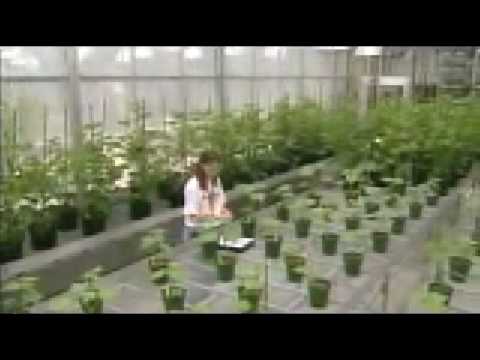
Watch this video on YouTube
The World According to Monsanto – is a 2008 documentary film directed by Marie-Monique Robin. Originally released in French as Le Monde Selon Monsanto, the film is based on Robin’s three-year long investigation into the corporate practices around the world of the United States agricultural giant, Monsanto. The World According to Monsanto is also a book written by Marie-Monique Robin, winner of the Rachel Carson Prize (a Norwegian prize for female environmentalists), which has been translated into many languages.
GMO LABELING & PROP 37
By Jessica Aldridge and Ki Coulson from Burbank Green Alliance
You are what you eat…but what if you don’t know what you are eating?
Why do we need GMO Labeling?
Proposition 37 was the California Right to Know Genetically Engineered Food Act, that was rejected by voters after serious expenditure by Big Ag and food giants. The initiative would have required food sold in retail outlets to be labeled if it is genetically engineered. Labels are required for GMOs in over 40 different countries, as seen on the map in green.
What are GMOs?
Genetically Modified Organisms, GMOs, have had their DNA artificially altered by adding genes from other animals, plants, viruses, or bacteria. This addition of foreign genetic material is inserted into a plant or meat product to make what is now an experimental genetically engineered food that is not naturally occurring in nature.
Are GMOs safe?
There has not been adequate testing to determine the long-term health effects of GMOs on humans. GMOs are not required to undergo safety studies for the U.S. Food and Drug Administration at this time and have not been proven safe. For more information on the potential health effects, including leaky gut see the additional web-links below.
Supporters for Yes on GMO Food Labeling
Over 1,200 donors have combined to contribute $2.8 million for the Yes on Prop 37 campaign. Endorsers include the American Public Health Association, United Farm Workers, Sierra Club, California Certified Organic Farmers, Organic Consumers Association, Consumer Federation of America, Nature’s Path, Lundberg Family Farms, Organic Valley, Dr. Bronner’s, Eden Foods, Mercola.com, Center for Food Safety and Food Democracy Now!
Supporters for No on GMO Food Labeling
The following companies are some of the companies that have made over $1 million in contributions to the No on Prop 37 campaign: Monsanto, DuPont, PepsiCo, Bayer, Dow, Nestlé, and Coca-Cola. Over 40 large corporations have contributed almost $25 million to stop the labeling of GMOs in California. The largest contributor to the No on Prop 37 campaign, Monsanto, ran ads in the UK in support of GMO labeling that began, “Food Labelling. It has Monsanto’s full backing.”
How do I reduce my intake of GMOs?
There are general guidelines that can help you reduce your GMO exposure and consumption. Certified organic products are a safe bet as they cannot knowingly contain any GMOs. Also, look for the Non-GMO Project verification logo on your products. Currently there are 8 GM crops sold for human consumption.
GM CROPS:
- Corn
- Soybeans (including soy ingredients)
- Canola
- Cotton/Cotton Seed Oil
- Sugar Beets (listed as sugar)
- Papaya (Hawaiian and Chinese)
- Zucchini (small amount)
- Yellow Crookneck Squash (small amount)
- Alfalfa (for forage crop and human consumption)
Also beware of hidden GMOs:
– Aspartame (NutraSweet, Equal, and AminoSweet)
– Sugar if non-organic or not 100% cane sugar
– Dairy products containing genetically modified rBGH/rBST
– MSG, TRANS-fats, vegetable oils, food starches, and more…
– May include variations of these crops like soy lecithin, soy protein, corn sugar, corn flour, and other hidden GM ingredients.
There is even the theory that humans can be negatively affected from consuming the meat of livestock which feed on GM crop.
Updated 8 March 2022

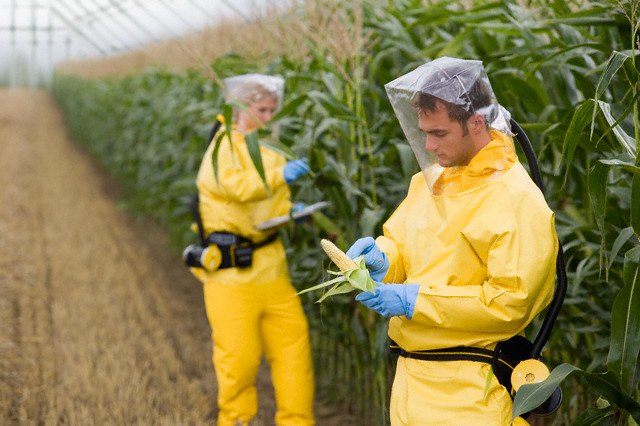

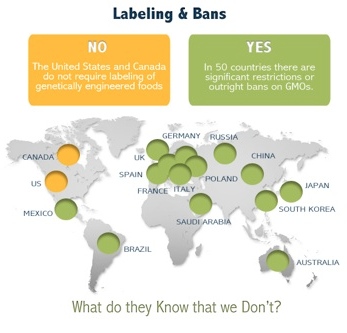
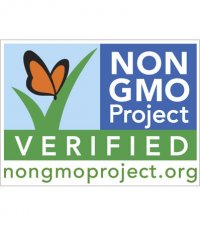

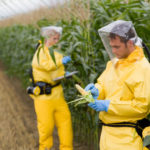

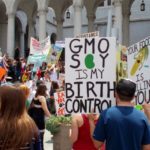
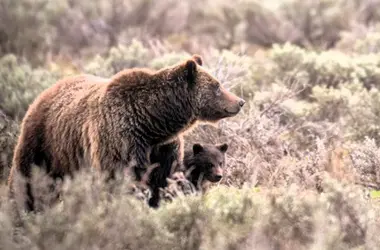





Here it is less than four weeks until election day and still I find people unaware of the importance of proposition 37, most do not even know what it is. These people I speak of are in food services.
My recommendation is to contact places like Trader Joe’s (626) 599-3700 and request that they hang huge banners in support of voting yes on prop 37.
Next, ask your favorite restaurants to support voting yes on prop 37 by reminding their customers to vote.
Why is this so important? It is a signal that the world community will no longer tolerate the greedy and dangerous business practices of corrupt corporations.
Thank you,
Elizabeth Lerer